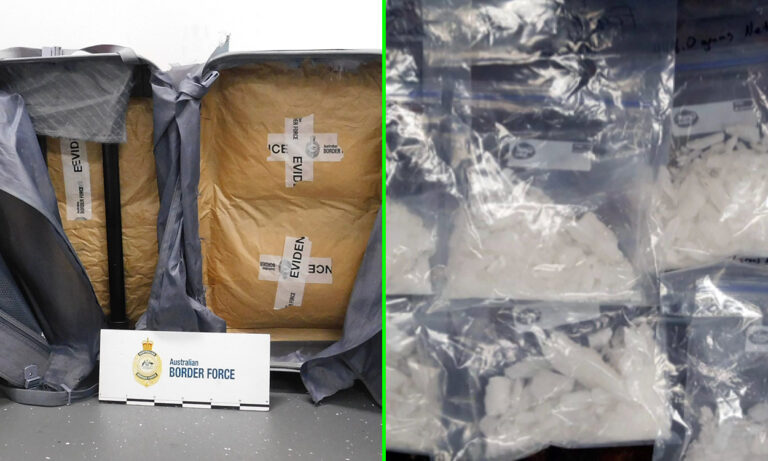German pensioners caught smuggling 22 pounds of crystal meth into Australia
Two German pensioners were caught at Sydney Kingsford Smith Airport with 22 pounds (10 kilograms) of methamphetamine, more commonly known as crystal meth.
The two 69-year-old travellers, who have since been identified by the names Wilfried and Vera D., arrived in Australia on 4 July after setting off on a flight from Zimbabwe and transiting through South Africa.
They were lucky enough to avoid getting stopped and searched until the Australian Border Force (ABF) decided to examine their luggage upon arrival at the international airport. The large amount of methamphetamine was found hidden in the lining of the duo’s two suitcases with images showing that they were wrapped in brown packages and labelled ‘evidence’ once they had been seized by the Australian Federal Police (AFP).
As initially reported by UNILAD, the two pensioners were indicted with “importing a commercial quantity of a border controlled drug, namely methamphetamine, contrary to subsection 307.1(1) of the Criminal Code Act 1995 (Cth).” In the country, such charges carry a maximum penalty of life in prison.
In a news report shared by the AFP, Detective Sergeant Angy Polic said the law enforcement agency is working with its international partners to investigate the origins of the drugs seized and stated, “The likelihood that two people can act alone to source a commercial quantity of methamphetamine is rare—organised crime syndicates are often behind such importations.”
“The AFP continues to diligently work to identify and dismantle criminal groups responsible for the importation of illicit drugs into Australia, particularly those seeking to exploit the increased number of arriving flights catering for the resumption of international travel. The AFP and its law enforcement partners remain committed to disrupting organised crime syndicates who seek to harm Australians,” Polic continued.
The successful seizure of the crystal meth is estimated to have saved the community more than $4 million in “drug-related harm, including associated crime, healthcare and loss of productivity,” the AFP added.
Australian Border Force Commander Trade and Travel Operations East, Sue Drennan, also revealed that this is just one of the many attempts made by travellers to bring illegal substances into the country that the ABF has intercepted.
Tough luck, Wilfried and Vera, that’s what you get for trying to be gangsters at 69…






